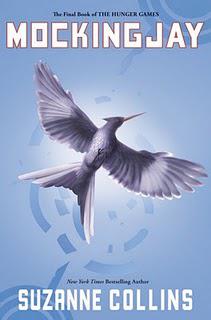Mockingjay

Mockingjay has finally arrived to conclude the breathtaking trilogy that began in 2006 with the conclusively-titled The Hunger Games. And this time, things have changed. In global effect, for better or worse, the main characters are bringing the furious fight to the enemy’s doorstep, in an act of rousing rebellion. But do they prevail? Well, I can’t answer that.
In Mockingjay, Collins holds her own under external pressure to show the blunted faces of the worst brought out in humanity, but also the best of what makes us human, compatible life forces willing to love, to teach, and to learn in the shadows of dark times. What was merely a sadistic game of cat-and-mouse is now a battleground, a fledgling place where heroes are born and lives are lost. Every punch is pulled, which is not to say the first and second books didn't contain conflict, but things are now broadened on the horizon. The characters realize they have entered an alien place, a wildfire atmosphere only done justice by a single word: war.
What really propels this book is its characters, particularly Katniss, who fight for what they believe in and stand alongside those they love. Each play pivotal roles in supporting each other, and adds a unique back story, just when you thought everything was already revealed. Loyalties are tested and occasional twists paint a very thin line between good and evil, relishing in the fact that, as human beings, we are collections of both.
Any age can enjoy this book; however, the content is some of the most unwaveringly brutal and violent written work on the young adult market. Accusing The Hunger Games of glorifying violence is putting a very narrow perspective on things. The violence is there because it is necessary, willing to achieve a point by demonstrating the calculating monstrosities of war, warning readers about the implications of certain decisions, and feeling powerless to stop others of a higher social status.
The inclusion of a strong female heroine give a sense of feminism to the book. At times, Katniss remained stricken, almost too conflicted, but it is a foreplay, a buildup to the explosive climax. She learns things about herself, growing as a person. It is the emotion, what we feel in our heart, not the misguided actions that make us for who we are. Everyone has a flaw, whether it be acid, spiders, or fear itself.
All the while, Collins maintains the pacing she keeps in the previous two. I was floored from the first page all to the way to the spectacular last. Small things are left unanswered, forcing the reader to come away from the experience to visualize, decoding what they think and understand.
By the time I finished, Mockingjay left me conflicted but satisfied, ruminating on the implications of what I read. Thankfully, it was a virtuoso performance I will not forget in a hurry. And not many books can do that. In a sense, young adult literature has some startlingly powerful messages to deliver, even branded for a younger generation. Older readers, and even fully-fledged adults, would find much to enjoy here.
Mockingjay delivers a stark limelight of the gratuitous impact of war on life, and examines the most powerful force on the planet through post-trauma, blood, tears, and the unbreakable substance of love. It is a masterful conclusion to an already groundbreaking series in young adult literature. If you haven’t experienced the raw potential for what The Hunger Games is all about, then I highly recommend doing so.
Excerpted from Literary Musings